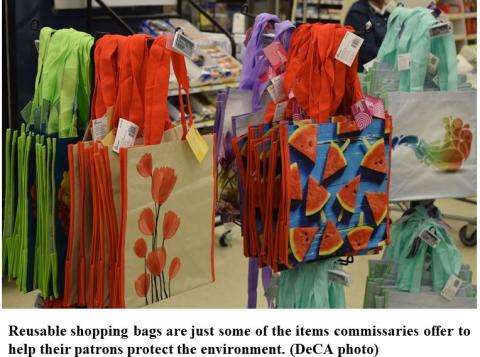‘SHRINKING OUR FOOTPRINT’: On Earth Day and throughout the year, commissaries continue yearlong commitment to the environment

NOTE: To see a DeCA video related to this release, click here.
FORT GREGG-ADAMS, Va. – With Earth Day approaching on April 22, the Defense Commissary Agency (DeCA) is highlighting the agency’s ongoing efforts to protect the environment through actions such as recycling, offering reusable shopping bags and environmentally friendly products, conserving energy and more.
“DeCA is always working to shrink our footprint,” said Steve Edlavitch, DeCA engineer. “As we are part of the global community, we must ensure that we reduce our impact on the environment as much as possible.”
According to EarthDay.org, this year’s theme is “Our Power, Our Planet,” which matches DeCA’s efforts to minimize its environmental footprint. To that end, DeCA has started replacing its aging supermarket refrigeration systems with lower global warming potential (gwp) refrigerant gases, like carbon dioxide (CO2) based systems, at its stores.
CO2 is considered a natural refrigerant with a low global warming potential (gwp) of 1. It also is not considered an ozone-depleting substance (ODS), giving it an advantage over traditional Hydrofluorocarbons (HFC). Using CO2 refrigerant gas systems help DeCA comply with federal environmental regulations related to air quality.
DeCA periodically audits agency facilities to pinpoint areas where energy is not being used efficiently, such as inefficient equipment, poor insulation or outdated systems. The audit results help the agency reduce energy consumption and lower emissions from our buildings. Also, agency investment in newer supermarket equipment can provide long-term cost savings, enhanced customer experience and data-driven decision making.
Earlier this year, select commissaries in Europe began the transition from single-use plastic shopping bags to fully recyclable and reusable options. Commissaries now offer large bags, paper bags with handles and a full assortment of designer reusable bags. By following local regulations, DeCA s keeping thousands of single use bags from the waste stream.
Over the last year, DeCA has recycled or diverted over 91 million pounds of materials from landfills worldwide. The agency recouped over $1.4 million that was returned to the surcharge fund. The agency diversion rate was 58% for FY24 as compared to 60.6% for FY23.
In FY24, DeCA recycled or diverted the following commodities:
- Equipment liquidation - 34,668 pounds
- Cardboard - 70,386,640 pounds
- Food donations - 5,710,770 pounds
- Plastic - 1,725,322 pounds
- Wood pallets - 7,005,472 pounds
- Compost – 1,968,897 pounds
- Fat and bones - 406,152 pounds
- Wood - 1,395,951 pounds
- Local farm – 278,180 pounds
- Consolidated recyclables – 592,300 pounds
- Metal - 538,152 pounds
- Other recyclables – 620,473 pounds
- Rotisserie chicken oil - 76,775 pounds
- Office paper - 242,324 pounds
- Fryer oil - 9,780 pounds
- Food recovery (organics) - 693,996 pounds
- Aluminum cans – 18,156 pounds
- Toner cartridges – 903 pounds
- Glass- 56,033 pounds
A major component of the agency’s environmental program is the food donation program. In 2012, DeCA began donating edible but unsellable food to local food banks located near stateside commissaries. The food bank program diverts edible products from landfills, while also helping feed those struggling to put food on their table.
Since 2012, over 46 million pounds of food have been diverted from landfills. In 2024, the agency donated 5.7 million pounds of food through this program.
“DeCA’s food donation program is critical to provide assistance to those who are struggling with food insecurity,” said Edlavitch. “They help provide a local food source for communities to support people in need, especially during difficult times like these when food prices are rising.”
Commissaries also make it easier for patrons to live more sustainably by offering environmentally friendly products. For example, patrons can find organic produce, energy-saving compact fluorescent and LED light bulbs, high-efficiency laundry products, environmentally friendly cleaning products and reduced packaging products like paper towels and bathroom tissue.
Patrons can also find Full Circle Market, a Commissary Store Brand, on store shelves which provides sustainable choices with all-natural ingredients while not costing a fortune or sacrificing taste.
According to the brand’s website, their “organic foods are farmed and produced without chemical treatments and processing. Full Circle Market organic foods have been produced using cultural, biological and mechanical practices that support cycling on-farm resources, promote ecological balance and conserve biodiversity.”
“It’s all about protecting human health and the environment,” Edlavitch said. “Whether it’s offering environmentally safe products our customers can use or donating edible food that doesn’t end up in a landfill, DeCA is doing its best to safeguard the environment.”
-DeCA-
About DeCA: The Defense Commissary Agency operates a worldwide chain of commissaries providing groceries to military personnel, retirees, disabled veterans and other authorized patrons and their families in a safe and secure shopping environment. Commissaries provide a military benefit, saving authorized patrons thousands of dollars annually on their purchases compared to similar products at commercial retailers. The discounted prices include a 5-percent surcharge, which supports the costs of building, modernizing and sustaining commissary facilities. A core military family support element and valued part of military pay and benefits, commissaries contribute to family readiness, enhance the quality of life for America’s military services and their families, and help recruit and retain the best and brightest men and women to serve their country.
